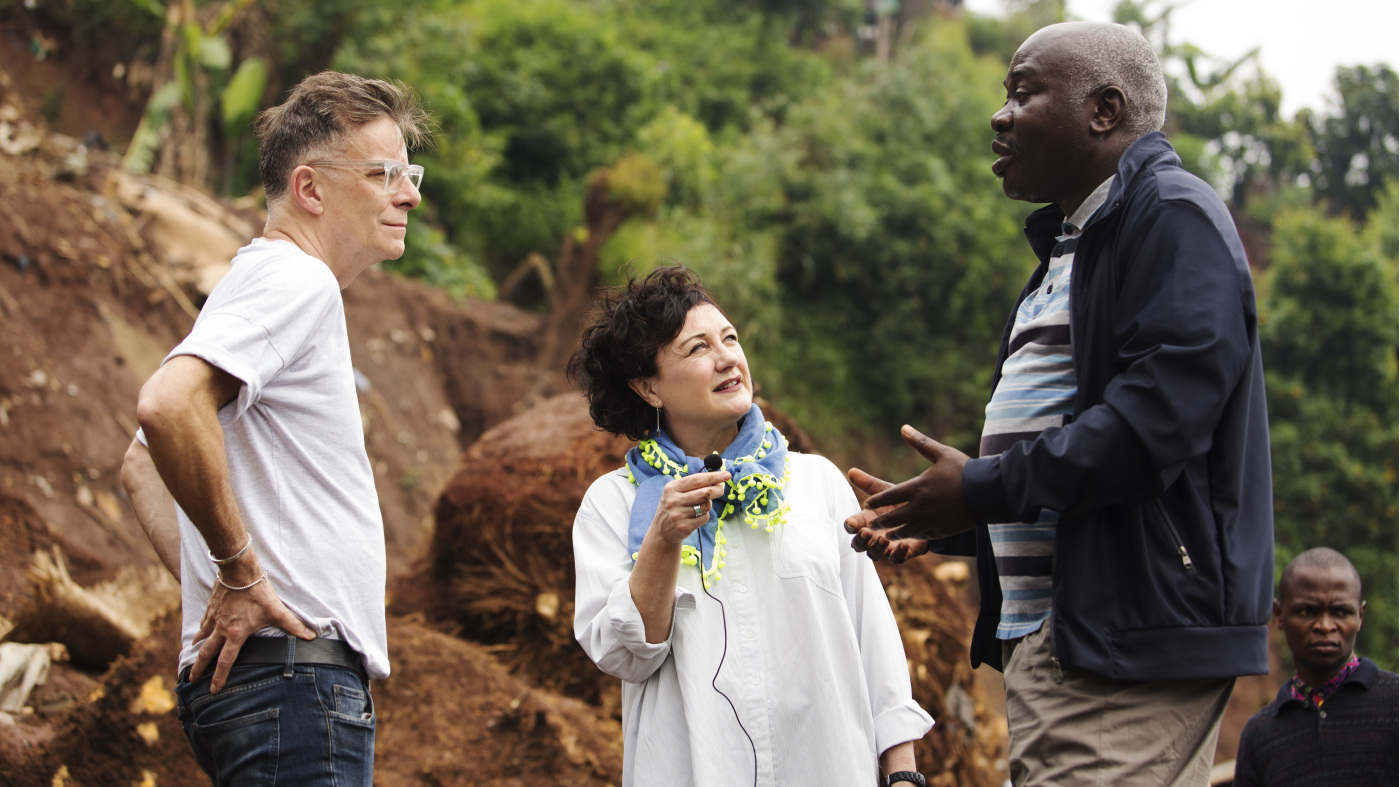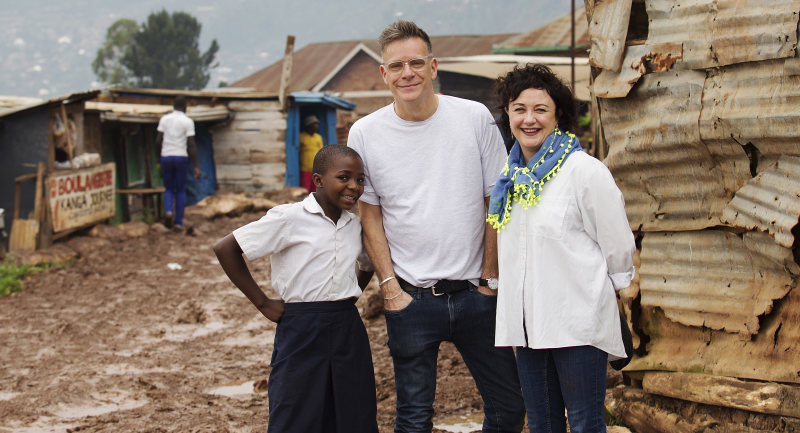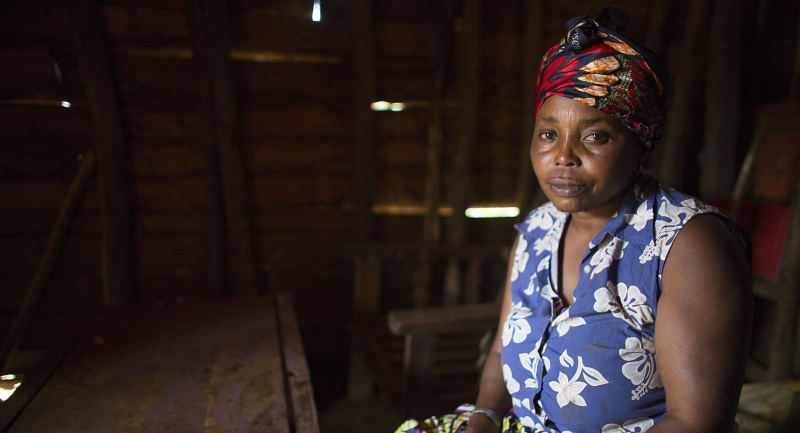Reflections on DR Congo
17 May 2020

In January of this year, SCIAF Ambassadors Ricky Ross and Lorraine McIntosh travelled with us to the Democratic Republic of Congo to see how donations from Scotland were helping survivors of sexual violence to rebuild their lives.
Upon his return, Ricky Ross began an email exchange with Douglas Alexander – a fellow Scot, who, in his time as Secretary of State for International Development, had also visited DR Congo and knows well the challenges the country faces.
As they traded their thoughts and experiences, a fascinating insight into DR Congo began to unfold.
Ricky and Douglas have kindly shared their correspondence with us. Their conversation makes for compelling reading, and their perspectives paint a vivid and detailed picture, covering everything from SCIAF’s work and the role of the Church in DR Congo, to the threat from coronavirus and the hopes for long term peace in a beautiful country, rich in natural resources.
Ricky Ross writes…
Dear Douglas,
Lorraine and I have recently returned from visiting The Democratic Republic of Congo and Rwanda with SCIAF. I suppose there are many conclusions to draw but, with your own background in International Development, I hoped that you could reflect on some of what we witnessed on our visit.
The main purpose of our time in DR Congo was to see the support SCIAF were giving to women who had suffered sexual abuse by gangs of militias.
According to some reports, 40% of women in eastern DR Congo have been raped. For these women, the violence is often only the start of their suffering.
Frequently, survivors contract HIV as a result of their attack. There is still a great deal of stigma around sexual violence and HIV in DR Congo, so children born as a result of sexual violence are often excluded from the communities they are raised in. Many women have been too frightened to share their stories, or seek help, for fear their husbands and extended families will refuse to support them.
We met a large number of women who have been supported by SCIAF medically, socially and economically. There is an impressive amount of gender education going on with men and women from the South Kivu area which SCIAF’s partners are encouraging and supporting. However, we were still concerned that the violence in and around this part of DR Congo has carried on for such a long time. We heard many explanations about the violence and why it had happened but I wondered what your own thoughts were concerning the attacks and the lack of a settled peace in the area?

(pictured above: Ricky and Lorraine meet children near the city of Bukavu)
Douglas Alexander replied...
Dear Ricky,
It was good to hear about yours and Lorraine's recent visit to DRC to support SCIAF - they do excellent and vital work, not only supporting women following violent attacks and in trying to combat the spread of HIV and AIDS in the country, but also in trying to alleviate poverty across the continent.
The account you share of the threat of violence many women face in the DRC is not unfamiliar to me and is one of the most distressing realities about the continued presence of armed militia in the country. Behind these statistics are stories of real human suffering so it is right that we examine the myriad of reasons giving rise to the challenging environment in the DRC. Let's start with the country's very troubled recent history.
The Democratic Republic of Congo is a country blessed with huge mineral resources, and in part as a result, has been affected by both civil war and corruption. In the East of the country violence continues to be perpetrated by armed militias, despite the largest UN Peacekeeping mission anywhere in the world having been in operation in the region since 1999.
Until recently, the DRC was the centre of what some observers characterised as "Africa's World War" with an estimated six million lives being lost to a combination of conflict, disease and malnutrition.
It is a vast country: geographically about five times the size of France, however, as I heard when I visited, it has about the same amount of tarmacked roads as Wiltshire. This lack of infrastructure not only contributes to the economic challenges of the country, it also makes the work of SCIAF and other aid organisations more difficult in deploying resources to South Kivu and the other twenty-five provinces which make up the DRC.
No doubt there is huge potential within the DRC but right now it's being held back by poor governance, weak security, and significant corruption. Addressing those core issues is the key first step to ensuring a settled peace in the country.
Against that backdrop, why don't you share your impressions of the work that SCIAF are doing in the DRC and the impact they are having on the ground?

(pictured above: Douglas Alexander speaks about the challenges faced by DR Congo at a SCIAF event in 2020.)
Ricky writes...
Thanks Douglas,
I think the interesting contrast for us was how much was being done by SCIAF and their CARITAS partners compared to the government and local authority. For instance, our first stop was at the Diocesan Centre For Justice and Peace. Led by Father Justin Nkunzi the centre offers psychological, medical, legal and economic support to women who have suffered sexual violence at the hands of the guerrilla groups who terrorise the countryside.
It’s amazing to meet women whose lives have been changed by surgery provided at the Katana Hospital which SCIAF and their partners have supported. One woman said to me, ‘I have my life back.’
This feeling was common among the women we met. As I mentioned, sexual violence is often only the start of the journey of pain they endure. Following an attack, women often discover they are HIV positive and many become pregnant. As result, they are often isolated by their community. One woman we spoke to talked about her in-laws excluding her from the family circle even as she witnessed one of the perpetrators of her ordeal walking freely around her village. Another common outcome for survivors of sexual violence are terrible internal injuries such as fistula, which can cause extreme pain and incontinence.
For the women I met, the help they received at the Katana Hospital has brought hope. On our visit we’d ask SCIAF’s local partners if we could speak to 4 or 5 women who’d be comfortable to share their experiences. Regularly, 12 - 16 women would turn up keen to explain how their lives had been improved.
There’s no doubt that SCIAF is making a big difference. However, it strikes me that at some point, the DR Congo will need to do more to support its citizens. In your experience, what needs to happen here for the country to move forward? I imagine security is a central issue here?
 (pictured above: Sylvia, a survivor of sexual violence in DR Congo)
(pictured above: Sylvia, a survivor of sexual violence in DR Congo)
Douglas responded...
Ricky,
You are absolutely right to recognise the importance of security in making progress for a country like the DRC. As well as the human suffering, you have witnessed firsthand, caused by a lack of proper security, one way to view conflict is really as, 'Development in Reverse': It strips a country of its potential gains in human, social, and economic development.
Yet, delivering security in a country is really a subset - albeit a vital one - of good governance, which is the strongest foundation for a country's development. An important element of good governance is also tackling corruption. Corruption holds countries back and - in the case of the DRC - keeps the poor poor.
That's why, when I was the UK's Secretary of State for International Development, I invested British aid money in tackling corruption in the DRC. On a practical level, that involved "scrubbing" the Congolese Government's lists of soldiers (to whom precious salaries were being paid) of thousands of "ghost soldiers" to help put an end to that corrupt use of public money.
My years in the Development Department convinced me, however, that while Government to Government action can be important, there is no substitute for a free press and an empowered citizenry in exposing wrongdoing and working for and demanding better governance. Civil society organisations have a vital role to play.
I'd be keen to know: What is your sense of how central is the role of the Church in helping the citizens of the DRC at the present time?
Ricky replied...
Thanks Douglas,
That’s a very easy question to answer. We were struck by just how much the church and SCIAF’s partners were doing. In fact, it’s not hard to conclude that if you want to see where the church is really making a difference in the world you really need to go to a developing country.
For survivors of sexual violence the OLAME centre is a place of refuge and hope. Run by the Diocese in South Kivu it offers social and psychological support to the women who have been traumatised by sexual violence. It’s a similar story with medical and legal support as the women would be unable to get any of this help without the support of the church’s agencies in and around South Kivu.
To illustrate this Father Justin, the local priest, took us on a tour of his parish. A couple of weeks before our arrival the rainy season had caused a landslide on the hill where some houses had been built. Around half a dozen homes were swept away and five people, including three children from one family, were killed. The frightening detail however was the stories we heard about the rescue from Fr Justin’s parishioners. There had been no official response to the disaster, no local or central government rescue came to the aid of those trapped by the landslide and it was only after a few days that local people managed to retrieve the bodies from the rubble.
It’s notable that Father Justin’s house had to be kept secure and well protected. It seemed that speaking out about the situation in the country had brought the threat of violence to his doorstep. More worrying still was the assassination of two Archbishops in the region who had also been outspoken about the crisis affecting their country.
So, the church is doing so much and SCIAF’s appeal this year is fund matched by DFID in the UK for which we are grateful. However, since we started writing the coronavirus has spread like wildfire around the world. I can’t begin to imagine what it might do to a place like South Kivu. I also wonder how this will affect the support from people in Scotland who have so many things to worry about in their own families.
So perhaps you might reflect on giving to charities carrying out development work in these difficult times. How might we encourage people to consider Africa when trying to survive at home?
Douglas concludes...
Dear Ricky,
It's welcome news that the Department for International Development is matching SCIAF’s appeal. The UK aid budget is a vital instrument of global justice, and in the months ahead - as the Covid-19 virus spreads - its going to be needed as never before.
For understandable reasons, the concerns about Africa are far from most people’s thoughts as we focus on the health and wellbeing of our families, friends and communities. Yet this virus is demonstrating that none of us is safe until all of us are safe.
No continent is further away from universal health coverage than Africa, with half the population having no access to modern health care. What that means is that if Europe has one doctor for every 300 people, Africa has one doctor for every 70,000 people. Health systems are on the frontline of the fight against the epidemic, yet as Covid-19 spreads across Africa, cases have been recorded from Kinshasa to Kivu.
The DRC’s National Institute of Biomedical Research is able to carry out around only 50 tests a day and presently has no vehicles or fuel. In total, the DRC, with a population of some 80 million people, has a few dozen ventilators across the whole country. So the threat is grave and the challenge is profound. Even amidst all the present challenges here in the UK, now is a time to step up and not step back from supporting Africa in this crisis. Because as we’ve discovered we’re only as strong as the weakest health system around the world.
That's why your recent visit to the DRC and your reportage on it is so important. It is helping to raise awareness of the human stories of suffering behind the statistics, and the fact that the small choices we make as individuals can really make a big difference. SCIAF and the work it does has always mattered and will be even more important during this crisis and in the changed world that this pandemic will leave in its wake.
Back to